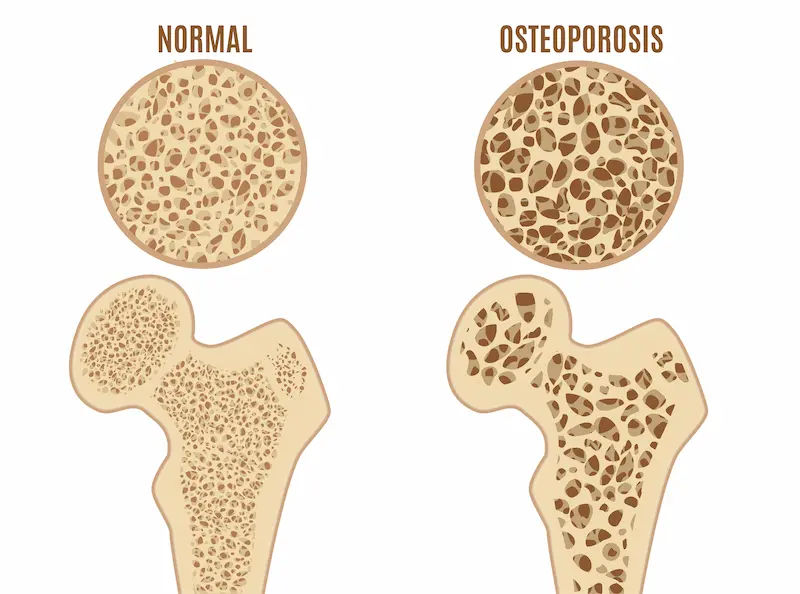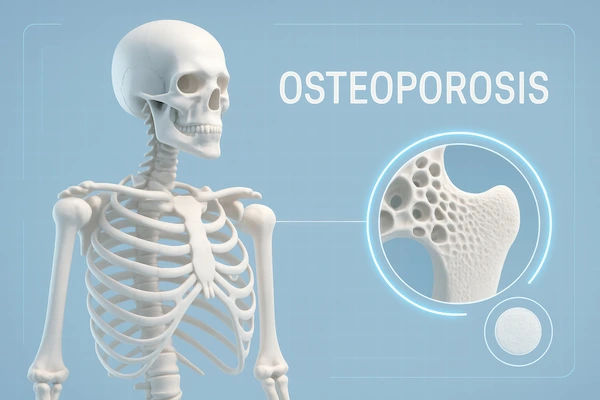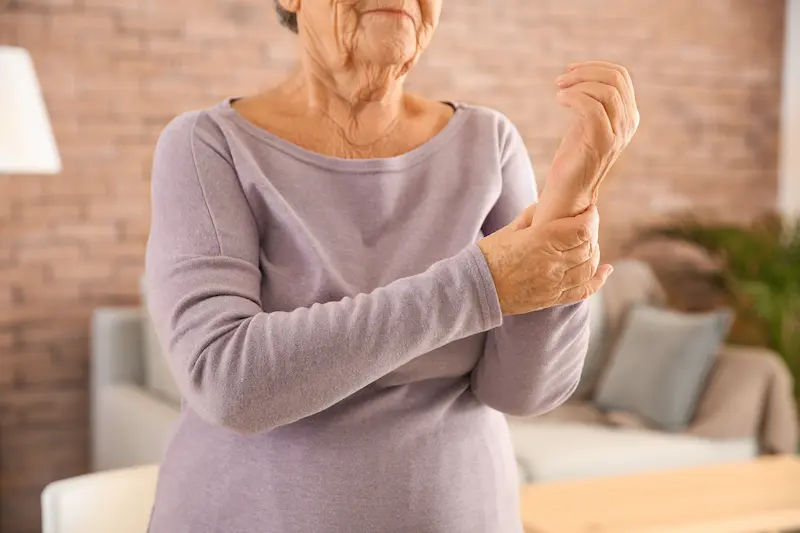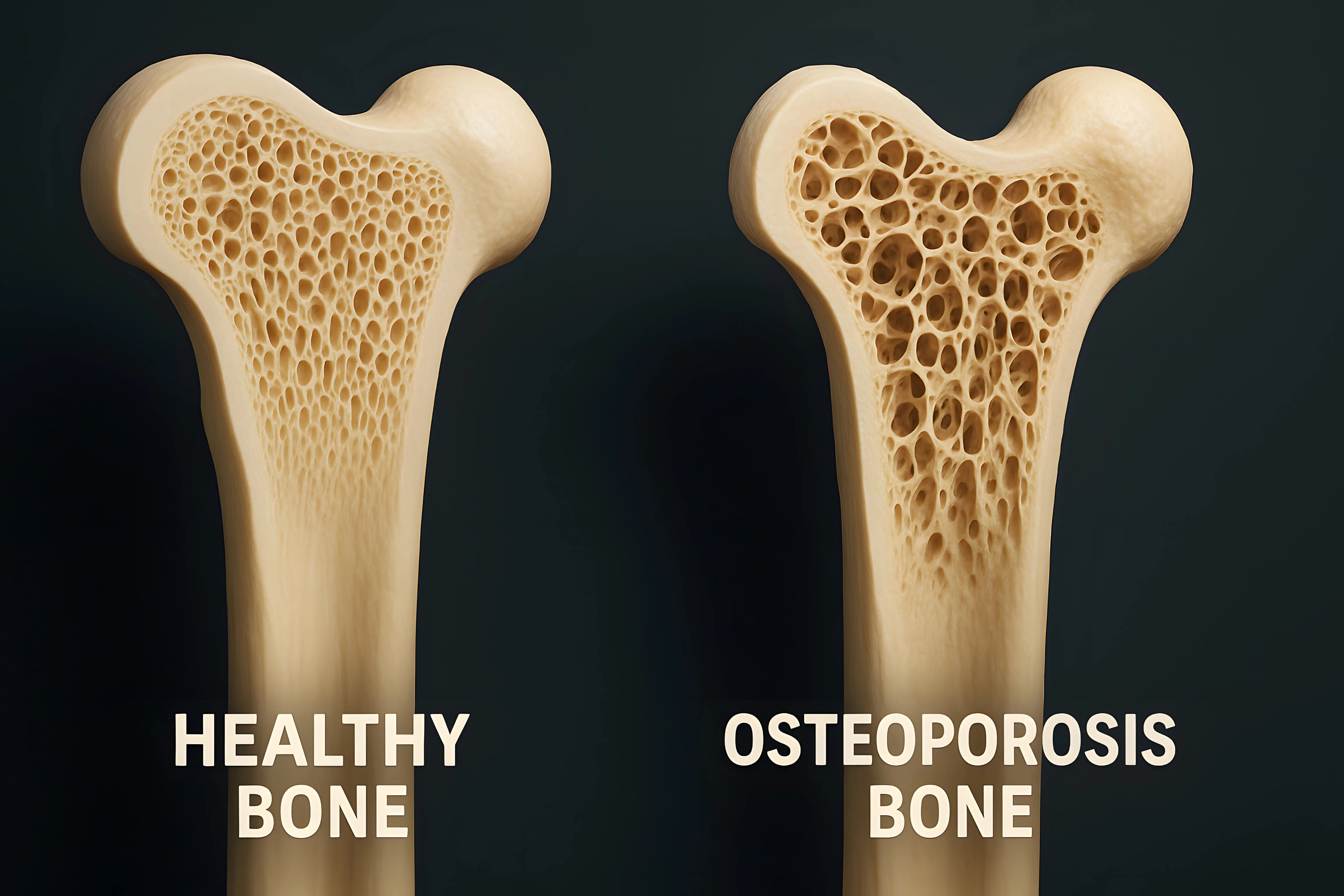Understanding Osteoporosis Symptoms and Treatment
Learn about osteoporosis, its symptoms, causes, and treatment options. Discover how to strengthen bones, prevent fractures, and manage this silent condition effectively.

Written by Dr. M L Ezhilarasan
Reviewed by Dr. Dhankecha Mayank Dineshbhai MBBS
Last updated on 13th Jan, 2026

Osteoporosis is a common but often overlooked condition that weakens bones, making them fragile and more prone to fractures. It develops silently over the years, and many people don’t realize they have it until a minor fall or sudden bump causes a bone to break. If you or a loved one are concerned about bone health, understanding osteoporosis; its symptoms, causes, and treatments; can help you take proactive steps to protect your bones.
What is Osteoporosis?
Osteoporosis literally means "porous bones." It occurs when the body loses too much bone, makes too little bone, or both. As bones become less dense, they weaken and are more likely to break, even from simple actions like bending over or coughing.
This condition affects both men and women, though postmenopausal women are at higher risk due to hormonal changes that affect bone density.
Common Symptoms of Osteoporosis
Osteoporosis is often called a "silent disease" because it progresses without obvious symptoms until a fracture occurs. However, some warning signs include:
Frequent fractures – Breaking bones easily, especially in the hip, spine, or wrist.
Loss of height over time – Due to compression fractures in the spine.
Stooped posture or curvature of the spine (Dowager’s hump).
Back pain – Caused by collapsed or fractured vertebrae.
Weak grip strength – Reduced bone density can make everyday tasks harder.
If you notice any of these signs, it’s important to consult a doctor for evaluation.
Causes and Risk Factors
Several factors contribute to osteoporosis, including:
Age – Bone density naturally decreases after age 30.
Gender – Women, especially postmenopausal, are at higher risk.
Hormonal changes – Low estrogen (in women) or testosterone (in men) weakens bones.
Family history – A parent or sibling with osteoporosis increases risk.
Low calcium and vitamin D intake – Essential for bone strength.
Sedentary lifestyle – Lack of exercise accelerates bone loss.
Smoking and excessive alcohol – Both weaken bones over time.
Certain medications – Long-term use of steroids or acid reflux drugs can affect bone health.
How Osteoporosis Affects Health
Untreated osteoporosis can lead to serious complications:
Fractures – Hip fractures can result in long-term disability.
Chronic pain – Spinal fractures cause persistent back pain.
Reduced mobility – Fear of falls may limit daily activities.
Loss of independence – Severe cases may require assisted living.
The good news is that osteoporosis can be managed and even prevented with the right approach.
Treatment and Management
Medical Treatments
Bone-strengthening medications – Bisphosphonates (like alendronate) slow bone loss.
Hormone therapy – For postmenopausal women, estrogen replacement may help.
Calcium and vitamin D supplements – Essential for bone repair.
Newer therapies – Injectable medications (like denosumab) for severe cases.
Your doctor will recommend the best treatment based on your bone density scan (DEXA scan).
Consult an Orthopedist for the best advice
Lifestyle Changes to Strengthen Bones
1. Eat a Bone-Healthy Diet
Calcium-rich foods: Dairy, leafy greens, almonds, and fortified foods.
Vitamin D sources: Sunlight, fatty fish, eggs, and supplements if needed.
Protein: Helps maintain muscle and bone strength.
2. Exercise Regularly
Weight-bearing exercises (walking, dancing, jogging).
Strength training (lifting weights, resistance bands).
Balance exercises (yoga, tai chi) to prevent falls.
3. Avoid Smoking and Limit Alcohol
Both weaken bones.
4. Prevent Falls
Use handrails, non-slip mats, and proper lighting at home.
Wear supportive shoes.
Get vision checked regularly.
When to See a Doctor
If you’re over 50, have a family history of osteoporosis, or have experienced fractures from minor injuries, consider getting a bone density test (DEXA scan). Early detection helps prevent severe bone loss.
At Apollo 24|7, you can book a consultation with a specialist or schedule a DEXA scan easily online. Taking action now can protect your bones for the future.
Final Thoughts
Osteoporosis doesn’t have to control your life. With proper diet, exercise, and medical care, you can maintain strong bones and reduce fracture risks. If you suspect osteoporosis or have risk factors, don’t wait; talk to a doctor today.
Consult an Orthopedist for the best advice
Consult an Orthopedist for the best advice

Dr. Anil Pradeep Jadhav
Orthopaedician
23 Years • MBBS MS (Ortho)
Nashik
Apollo Hospitals Nashik, Nashik
(25+ Patients)

Dr. Suraj Prakash
Orthopaedician
5 Years • MBBS, MS (Ortho)
Bengaluru
Apollo Clinic, Indiranagar, Bengaluru

Dr. Padam Singh Gautam
General Physician/ Internal Medicine Specialist
43 Years • M.B.B.S (WARDHA M. S.), F.A.G.E. (MANIPAL), F.A.I.M.S. (Pb.), M.A.I.M.S. (Pb.), M.R.S.H. (LONDON)
Noida
Dr Padam Singh Gautam Fracture Clinic, Noida

Dr. Susheel B
Orthopaedician
13 Years • MBBS, MS, Ortho Fellowship in Trauma ( Germany) Fellowship in Arthroscopy and Arthroplasty ( Switzerland)
Bengaluru
Apollo Medical Center, Marathahalli, Bengaluru

Prof. Dr. Jambu N
Orthopaedician
23 Years • MBBS, M.S Ortho, FRCS ,FACS
Chennai
Apollo Speciality Hospitals Vanagaram, Chennai
(150+ Patients)




 (1).webp)